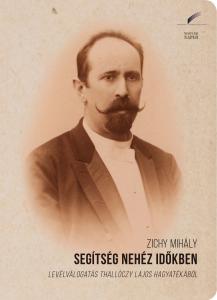
Help During Hard Times
Segítség nehéz időkben. Levélválogatás Thallóczy Lajos hagyatékából (Help During Hard Times. Selected Letters from Lajos Thallóczy’s Legacy)
Edited and compiled by Mihály Zichy
NSZL – Magyar Napló Publishers Ltd., Budapest, 2018, 280 pages
ISBN 978-615-5195-48-8
Lajos Thallóczy’s figure in Hungarian history and the history of science has been largely undeservedly forgotten so far, and remains obscure compared to his merits.
As an official of the Joint Ministry of Finance, his scholarly achievements helped to shape not only the Monarchy's policy in the Balkans, but also the Albanian – and partly Bosnian – national consciousness in the modern sense. His research and source publications made him the greatest Hungarian Balkan expert of the 19th and 20th centuries. His style of writing is not rigid, boring, but instead – similarly to his personal character – engaging and fun. He sometimes wrote his letter in a vitriolic manner, but strangely enough, this style was not offensive.
It is no coincidence that Géza Gárdonyi addressed him with the following words: ‘To Lajos Thallóczy, the only rude man, who is kind when being rude.’ – The scholar, the chief official of the joint ministry, one of the outstanding leaders of the Hungarians in Vienna was eccentric and bohemian in the noblest sense of the word. He was also the leader of the famous and infamous club of intellectuals called ‘Büzértanya’, which served as a cradle for the next generation of Hungarian historians and the bastion of Hungarian intellectuals in Vienna.
Behind the bohemian, vitriolic appearance, Thallóczy was a practicing Catholic, a member of the Secular Franciscan Order, holding the Bible on his bedside table and reading it daily. When he arrived in Budapest, he always visited his parents' grave first, but he did not make this subject of public knowledge.
His political creed – in terms of Hungary's status in the Monarchy at that time, its long-term possibilities and development – was concise and logical: there is an agreement of interests between Hungary, the Hungarian nation and the dynasty. When the war broke out, he wrote in one of his letters:
‘... Well, we are waiting for the complications to develop. It seems to be reversed now. Just like the Goths used to be the helpers of the Huns, and they indeed served them faithfully except for the final period, now we are the outposts of the Germans. It’s not a nice role either, but we’re doing better with it than with the Russians and the Balkans because they are always lying. Germans are rude but honest.’
During the war, many turned to him for help because they knew he had not only influence but he was good-hearted. He feared that his letters might cause discouragement, but as the time passed, he hoped less and less that the war would end with a positive outcome. This selection didn’t get its title by accident – he helped where he could, usually not in vain. This correspondence is a faithful mirror: human tragedy, the spirit of the age, dignity and humor are present at the same time.
Shopping
Our publications are available in our bookshop, or can be ordered from the Publications Department of the NSZL using the contact details below: Főigazgatói Kabinet kiadványtára, Országos Széchényi Könyvtár, 1276 Budapest P.O. box 1205., phone: 06-1-23-23-506, e-mail: kiadvanytar@oszk.hu.




